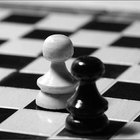
When people get angry with each other, they often say or do things without realizing the cause of their feelings. Understanding the dynamics behind a conflict can make it easier to resolve issues. This insight also can help you mediate a conflict between friends and relatives. Many experts break personal and professional conflicts down into basic types, based on the underlying causes of disagreements and the dynamics.
Structure Conflicts
These happen because of something the participants can't control. An example is spouses who work different shifts and therefor don't see each other very often. This can lead to tension and ultimately conflict.
Values Conflict
Sometimes people will have a conflict because they have a fundamental disagreement on fundamental values. For example, some people may value hard work above all else, while another person thinks it's wrong to waste your life on backbreaking labor.
Resources Conflicts
This is when two people fight because they both want something, but there aren't enough resources for both of them to satisfy their desires. The classic example is when people fight over money.
Ego Conflicts
Sometimes people come into conflict because they are jockeying for position. When you have two people who believe they should be in charge, conflict can easily erupt. A classic example would be the parent fighting with a rebellious teen.
Personal History Conflicts
Sometimes misdeeds between two individuals can build up over time, and people eventually become bitter. These pent up feelings can erupt and lead to conflict. An example would be a couple who constantly fight over a history of infidelity.
Personality Conflicts
There are cases where two people have totally incompatible personalities, and they will find each other difficult to tolerate. These kinds of incompatibilities can lead to conflict, especially if the people are forced to spend a lot of time together. For example, if you have one person who loves to talk, and another who hates talking while they work.
Conflict over Facts
People often have conflicts because they have a different interpretation of the facts in a situation. An example would be two religious leaders with different interpretations of a sacred text.
Related Articles

How to Manage Conflict With Peers

The Types of Conflict in Communication

Can Two Emotionally Unavailable People ...

What Are Cultural Variables?

What Is the Meaning of Judgmental?

Excessive Jealousy & Possessiveness

What Does Moral Dilemma Mean?

Communication Between Older & Younger ...

Empathy Training Activities

How to Address Cross Cultural ...

Perceptual Barriers to Communication

INFJ & ISFJ Relationships

Qualities of a Healthy Relationship

Examples of a Positive Attitude

What Are the Benefits of Effective ...

7 Types of Conflict

The Negative Effects of Jealousy

What Causes Jealousy in Relationships?

Types of Jealousy

Barriers to Effective Verbal ...
References
Writer Bio
Jacob Queen has been a professional freelance content creator since 2009. He has written articles on a variety of subjects for several online publications. He is also a guitarist, screenwriter and amateur filmmaker with more than 10 years of experience in each field. Queen studied English composition and literature at Truett-McConnell College.
Photo Credits
conflict image by Dmitri MIkitenko from Fotolia.com